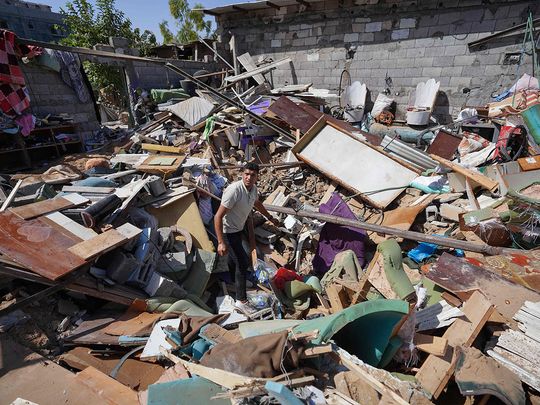
With the UN Security Council’s resolution earlier this month — mandating a ceasefire and outlining a road map for Gaza — the Israel’s war has entered what could be its final phase.
However, the journey ahead remains uncertain, as the complexity and challenges of the situation reside in the details.
Both Israeli and Palestinian sides hold entrenched narratives: Palestinians view the land as unjustly taken from them, while Israelis consider the land as their rightful homeland, citing historical rejection and persecution in Europe as reasons to never return.
This stark polarisation allows conflicts to end temporarily, regardless of duration, only to resume later under new circumstances.
The crucial question remains: When will this cycle of conflict, which has negatively impacted many neighbouring Middle Eastern countries, finally conclude?
Therefore, the conflict will only approach resolution when both sides agree to share territory, either through a two-state solution or a single state framework that ensures equal rights and obligations for all.
Legitimate security needs
Regardless of the causes and trajectories of the 2023—2024 Gaza war, the aftermath will undoubtedly bring change.
Future leaders, not necessarily the current ones, will face a decisive choice: perpetuate a generations-long conflict that devastates the land and people, or forge a courageous agreement.
Achieving peace requires discarding myths and acknowledging the legitimate security needs of both Israelis and Palestinians.
The reoccupation of Gaza would signify a regression to initial conditions, as would Hamas’s continued governance there. While enormous sacrifices have been made, the Palestinians’ interactions with Israel have partly persuaded the international community of the viability of a two-state solution.
However, this solution hinges on a unified and recognised Palestinian government. Although Hamas historically opened the door to this possibility, its belief that it can continue fighting while retaining power suggests stagnation rather than progress towards peace.
It goes without saying that the Gaza war has effectively ended the phase of “liquidating the cause” from the Israeli perspective and the notion of “eliminating Israel” from the other side.
Demolition and reconstruction
However, the prospect of rebuilding Gaza under the presence of Hamas’s military wing is unlikely to gain international recognition, given the recurring cycle of demolition and reconstruction — this time with particularly severe destruction. Thus, the prevailing approach of the current leadership are unsustainable.
So, we are transitioning from a period of “closed thinking” in the Israeli-Palestinian conflict, moving stakeholders from anger to reflection.
The Israeli side will likely engage in a comprehensive reassessment post-conflict, evaluating the overall situation and its historical, non-material, and moral impacts on the nation.
This reflection could acknowledge the inadequacy of force alone to deter Palestinian national aspirations, potentially prompting significant and detailed changes within Israel. If similar introspection does not occur on the Palestinian side, it may serve as a justification for Israel to maintain its current stance.
Thus, the transition from conflict to peace in the Israeli-Palestinian context represents a shift from the “age of foolishness” to the “age of wisdom,” drawing on over a century of struggle.
The political movement on the global stage is also of great importance, necessitating an organised political effort to leverage the world solidarity movement effectively.
Stability and mutual respect
The international community generally recognises the Palestine Liberation Organisation, while Hamas is often viewed as a militia movement. The continued existence of Hamas as an armed entity disrupts peace efforts.
Historically, soldiers typically do not govern post-conflict; leadership usually passes to others, suggesting that tying warfare to governance could waste another historic opportunity for Palestinians to achieve statehood and freedom.
Furthermore, international advocacy should avoid emotionally charged slogans, as the US, whether we agree or not, is a primary active force. Simply criticising it does not facilitate solutions, especially now as it moves to promote a UN resolution for its own reasons, which mandates a ceasefire by the Security Council.
The bottom line in any endeavour is that if the sacrifices outweigh the gains, it necessitates a halt. The sacrifices in Gaza have been immense, affecting countless lives and causing widespread devastation.
This reality underscores the urgent need for a new approach to conflict resolution, one that prioritises sustainable peace and the well-being of all individuals involved.
Continuing along the current path of repeated violence and destruction only perpetuates suffering and hinders any progress towards a lasting solution.
Therefore, it is imperative to explore and implement alternative strategies that can break this cycle and pave the way for a future marked by stability and mutual respect.
Mohammad Alrumaihi is an author and Professor of Political Sociology at Kuwait University







_resources1_16a45059ca3_small.jpg)

